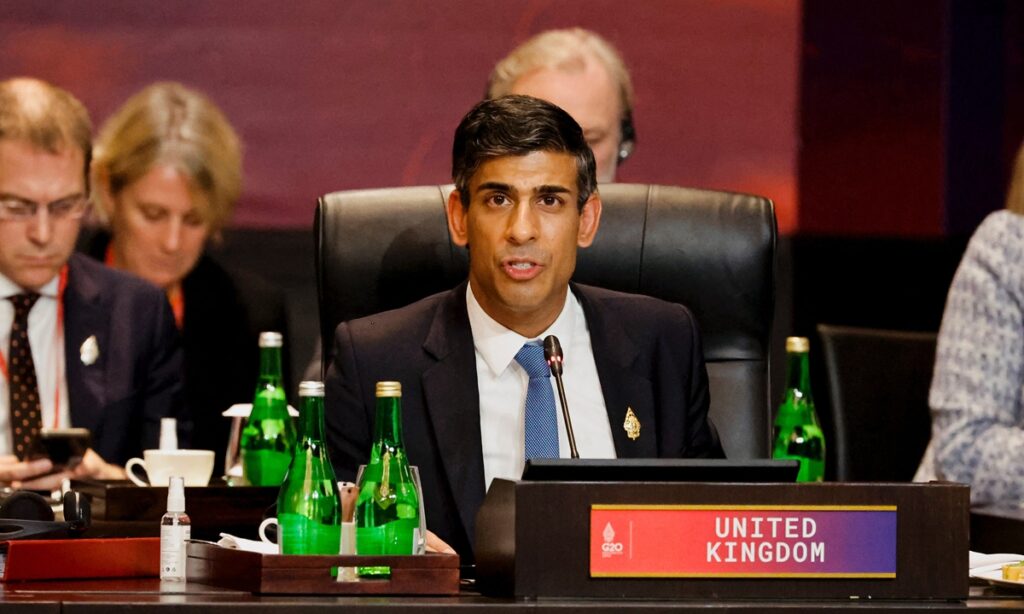British Prime Minister Rishi Sunak’s remarks on China made headlines in recent days. In his first foreign policy address as the new Prime Minster, Sunak claimed that the “golden era” of China-UK relations, believed to begin since 2015, “is over,” and that China poses a “systemic challenge” to the values and interests of Britain. But as much as he wanted to keep a distance from “simplistic Cold War rhetoric,” his remarks were still rife with ideological bias and self-contradiction.
On the one hand, he said the UK “can’t depend on Cold War arguments or approaches” anymore in the new world context. On the other, he tried to label China as part of an “authoritarian” bloc and suggested that trade with China failed to shape the country in the West’s image. On the one hand, he emphasized the UK’s enduring belief in openness. On the other, he proudly declared his government’s latest move to block the sale of a semiconductor plant to a Chinese-owned company, and the actions taken against China on 5G at the request, if not order, of the US.
In fact, it is somewhat surprising to hear Sunak’s statement on the “golden era.” As a former international investor and, more importantly, former Chancellor of the Exchequer, Sunak was better positioned than most Britons to see at first hand the tangible benefits and immense opportunities brought by the “golden era.” For example, two-way trade grew rapidly after the 2015 state visit, and more and more Chinese students are going to the UK to study, creating jobs and contributing to the growth of the British economy. Despite the impact of the pandemic, China has maintained robust trade with the UK and grown into its third largest trading partner, according to official statistics from the Department for International Trade.
Sunak vowed to take a “longer-term view on China” to strengthen the UK’s resilience and protect its economic security, but what he has done suggests otherwise. By closing doors to Chinese investors and fraying ties with China, the biggest growth driver of the global economy and potentially the biggest consumer market of the world, Sunak’s approach to China is counterproductive at best.
That said, Sunak’s remarks are not that surprising since the China discourse in Britain, and more broadly the West, has been poisoned. Politicians are competing to be the toughest, rather than the wisest, on China. There are clearly short-term political considerations behind Sunak’s words. But it is important for British politicians to remember that the “golden era” has delivered enormous benefits for both countries. It is not a favor granted by one side to the other, but a remarkable outcome of cooperation based on mutual respect. If there is any degree of dependence between China and the UK, it is mutual, as is always the case in trade and cooperation.
Overstretching the concept of national security and using interdependence as an excuse to target China would be unwise. China is not the cause to a host of economic difficulties facing Britain, such as the cost-of-living crisis and energy shortage. On the contrary, it is part of the solution. Just as the Chinese Ambassador to Britain recently pointed out, the quality and inexpensive products from China are helping British families deal with high inflation and maintain their living standard. For sure, China bashing will not help the UK government “deliver a stronger economy at home.”
Countries around the world already have their hands full with problems and challenges. From food and energy crises to post-pandemic recovery and climate change, global challenges require global solutions. What the world needs now is not confrontation disguised as “competition,” but the spirit of mutual respect and solidarity, and the courage to seek common ground while recognizing differences.
One month ago, when Sunak assumed office, the 20th National Congress of the Communist Party of China was just concluded. This presents fresh opportunities for the two countries to write a new chapter of China-UK relations. Instead of framing bilateral ties with the narrative of “systemic challenge,” the more reasonable and wiser choice for the Sunak government is to build on the momentum of cooperation nurtured in the “golden era” and work with China on the basis of mutual respect to deliver a better life for people of both countries.
(Global Times)




